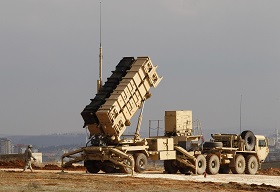The Camp David summit between Barack Obama and GCC states that took place on May 13-14 bears an enormous symbolic meaning for Washington as it echoes US Middle East peacemaking efforts under Jimmy Carter and Bill Clinton. This time, however, the summit’s goal was to reconcile the US with its long-time partners in the region, the Gulf Cooperation Council.
The Camp David summit between Barack Obama and GCC states that took place on May 13-14 bears an enormous symbolic meaning for Washington as it echoes US Middle East peacemaking efforts under Jimmy Carter and Bill Clinton. This time, however, the summit’s goal was to reconcile the US with its long-time partners in the region, the Gulf Cooperation Council.
The ties that have been weakening during Obama’s presidency have suffered a major blow due to Washington’s reluctance to stand by the Gulf states in Syria and more recently due to America’s decision to engage with Iran. Gulf monarchies are disturbed by the possibility of a real thaw in US-Iran relations as a result of the nuclear deal and see it as a major threat to their interests. The fact that John Kerry gets to spend more time with Javad Zarif, Iran’s Minister of Foreign Affairs, than any other envoy in the world speaks volumes about America’s foreign policy priorities, which makes the GCC so outraged. In their view militarily and politically Washington has been heavily reliant on the Gulf monarchies in the last two decades, so engaging with Iran is not exactly how they would like to see their favor returned.
Even before Camp David kicked off many analysts rushed to label it as a failure. The only two heads of state coming to the six-nation Gulf summit with Barack Obama were from Kuwait and Qatar. Quite significantly, Saudi, Bahraini and Emirati Kings preferred to send their top-level officials instead of showing up themselves. This became a first public display of a growing rift between Washington and the GCC.
The entire run-up to the summit turned out to be embarrassing for the White House. Ahead of the summit UAE Ambassador to the US Youssef Al Otaiba made a public statement that his country needs security guarantees from President Obama’s Camp David summit. He argued that the UAE and the US had a gentlemen’s agreement about security in the past, but given “the behavior of Iran in the region” the GCC needs guarantees in writing that Washington seeks to curtail Iran’s nuclear ambitions.
But despite strong diplomatic signals aimed at demonstrating Saudi and Emirati discontent with Obama’s policy, both countries still chose to send their top-level government officials to Camp David. King Salman sent the Crown Prince and Deputy Crown Prince Mohammed, his own son. The two officials are responsible for KSA’s foreign policy in war-torn regions of the Middle East, as well as for domestic security policy. Both Abu Dhabi and Manama sent Crown Princes, real policy makers in their countries.
At the end of the summit Barack Obama made it abundantly clear that he cannot sacrifice the chance for a historic breakthrough in Iran nuclear talks for GCC’s comfort. “I want to be very clear: The purpose of any strategic cooperation is not to perpetuate any long-term confrontation with Iran, or to even marginalize Iran,” he said. Obama reportedly managed to reassure the attendees that the nuclear deal does not represent America’s “pivot” towards Iran. As a show of diplomatic unity GCC representatives publicly endorsed Washington’s attempts to bring about a solution to the ongoing talks and said that a comprehensive and verifiable nuclear deal was in their interest.
Apart from Iran’s nuclear capabilities its involvement in regional affairs that is set to expand once sanctions are lifted also troubles the GCC. Qatari Emir Tamim Bin Hamad Al Thani was quoted as saying that the parties discussed interference of non-Arab countries in the regional affairs, clearly referring to Tehran. In a statement released at the Camp David summit the US and the GCC agreed to “cooperate in countering Iran’s destabilizing activities in the region and continue consultations on how to enhance the region’s security architecture.”
Quite significantly, one of the agreements reached at the summit was to jointly develop a region-wide ballistic missile defense capability and a ballistic missile early warning system. Several GCC states have necessary defense components in place already, such as short-range Patriot systems in Saudi Arabia and THAAD systems in Qatar, but the new agreement provides for the installation of a comprehensive system that would allow short- to long-range missile defense. The plan is particularly significant when one considers the GCC’s decision to create a unified military command (often likened in concept to an Arab NATO) that was reached in late 2014.
US-produced systems will of course be playing a key role in the development of GCC’s missile defense. In fact, US arms contractors, for whom the GCC is already a major client, stand to benefit the most from the agreements reached at Camp David. In this sense, the decision to create a missile defense system in the Gulf simply extends existing arrangements requiring provision of more military equipment and training.
Besides Iran and defense security the joint statement released at Camp David touched upon mutual concerns about the situation in Iraq, Libya, Syria and Yemen. But no real progress seems to have been reached on these issues, which was underpinned by very formal and overly general wording of the statement. The summit was mainly convened to convince the Gulf allies that they shouldn’t worry about the Iran deal but despite numerous reassurances by Washington GCC’s fundamental distrust with the Obama Administration’s intentions doesn’t seem to have changed.






